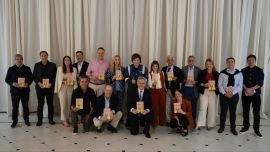Relatives of Colombian victims of the repression attributed to former president Álvaro Uribe (2002-2010) have presented the cases of 6,112 murders before a Buenos Aires judge. They invoke “universal jurisdiction” for crimes against humanity, war crimes, aggression and genocide with no statute of limitations. Swiss lawyer Bénédict De Moerloose advised the plaintiffs. Argentina is already pursuing criminal proceedings of the same kind about Venezuela, Nicaragua, Myanmar and Spain.
“The complaint was presented under universal jurisdiction, which empowers states to investigate, try and sanction the perpetrators of international crimes, wherever they were committed and irrespective of the nationality of the suspects or victims,” de Moerllose explained via email from Buenos Aires..
“Countries applying this principle with actual experience in the field frequently have such limitations as requiring the presence of the alleged perpetrators when the complaints are filed. Yet they are not in Argentina. On the other hand, it has extensive experience in the investigation of summary trials of crimes against humanity, with its proceedings against the 1976-1983 military dictatorship, and then by the examples of universal jurisdiction, due to the cases of Nicaragua, Myanmar, Venezuela and Spain,” explained the Geneva-based attorney.
“In addition, Argentina being a Spanish-speaking and South American country, and as such culturally close to Colombia, it was quite logical for us to suggest initiating the proceedings in this jurisdiction. This has the added fact that Álvaro Uribe Vélez has been to Argentina several times, one of them exactly one year ago”, concluded the Swiss lawyer.
As already mentioned, they are allegedly major criminals who have not been criminally pursued in the country where the events took place, or where the perpetrators reside. Thus, a third-party country, by acknowledging universal jurisdiction for the above-mentioned violations without statutes of limitations, may initiate court proceedings, and issue search and arrest warrants against the unpunished criminals. This is what happened 20 years ago with Ricardo Cavallo, former repressor who kidnapped and tortured people at the ex-ESMA Navy Mechanics School former clandestine detention centre in Buenos Aires.
Its case is an example of this “universal jurisdiction” over “crimes without statutes of limitation” as defined by the UN between Latin America and Europe. Cavallo was identified in Mexico by ESMA survivors in 2000. Three years later, he was extradited to Spain, where Judge Baltasar Garzón claimed him for “genocide”, given that the Laws of “Full Stop” and “Due Obedience” barred any trial in Argentina. Yet in 2008 he was once again extradited from Madrid to Buenos Aires, after those “impunity” laws were repealed, where he was sentenced in 2015. In 2020, French President Emmanuel Macron withdrew his National Order of Merit, granted in 1985 by then president François Mitterrand.
“It’s a legal principle which allows states (a treaty can make it an obligation as well) to try and punish some crimes without taking into account the place where they were committed, the nationality of the victim or the perpetrator. It is grounded on the idea that it must be possible for genocide, crimes against humanity, war crimes, among others, to be tried by all states because due to their seriousness they harm the entire international community (humanity)”, maintained a Latin American international expert in human rights.
“It is also intended that by applying universal jurisdiction there are no safe havens for the perpetrators of those crimes. The latter implies that even if they take shelter in a third-party country, it can return them to the place where the crimes were committed to be tried, or else they must be tried for the crime itself. This is called (in Latin) aut dedere aut judicare. For the victims and the families it has the clear sense of establishing a system to dispense justice against them, if not in their own countries, in others,” the expert concluded.


















Comments